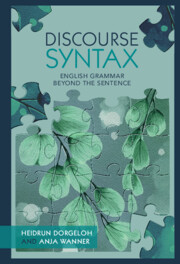4 - Variation in the Middle
from Part II - Grammar in Discourse
Published online by Cambridge University Press: 20 October 2022
Summary
Chapter 4 of Discourse Syntax (Variation in the Middle) introduces students to syntactic patterns that lead to sentences with non-canonical subjects or variation in the way the verb’s arguments are realized, including the object position. After discussing principles of canonical argument realization, including facts from language acquisition and insights from psycholinguistics, the chapter discusses the passive construction, including in preposition stranding contexts, and the verb-particle construction (also known as “phrasal verbs”), in the context of establishing topics, arranging given and new information, and shifting complex material to the end of the sentence (Principle of End-Weight). Woven into these explanations are data from current research in the text-linguistic and variationist approach and attestations from freely available corpora.
Keywords
- Type
- Chapter
- Information
- Discourse SyntaxEnglish Grammar Beyond the Sentence, pp. 88 - 129Publisher: Cambridge University PressPrint publication year: 2022

